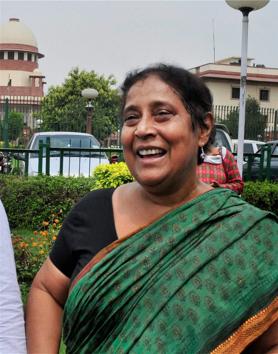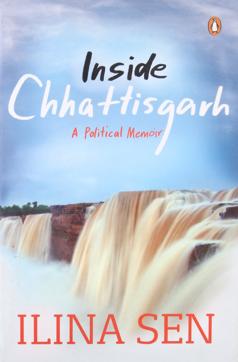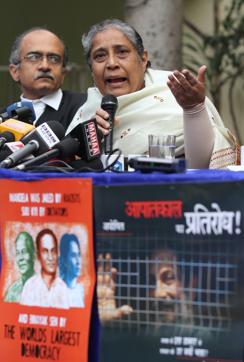Essay: A tribute to Ilina Sen
The author and activist seen through the eyes of her friends and co-travellers
As the news of scholar, activist and dog-lover Ilina Sen’s death travelled across cyberspace on August 9, 2020, it seemed urgent to see her through the eyes of her friends and co-travellers in the women’s movement. This legacy is an important one because patriarchal modes of record-keeping threaten to bulldoze a lifetime of service and teaching in their compulsion to speak of women primarily as wives and mothers. How does her work live on in the hearts of the people she worked with?

Mary E John, Professor at the Centre for Women’s Development Studies, says, “Ilina was concerned about the declining sex ratio in India, so she focused on this subject for her PhD at Jawaharlal Nehru University. It was pioneering work before sex selective abortions and ‘missing women’ became a hot topic. She came of age in the 1970s when movements led by workers’ unions, tribals and women were building a new political consciousness.”
Inspired by the work of Shankar Guha Niyogi, founder of the Chhattisgarh Mukti Morcha, Sen and her husband Binayak -- doctor and activist with the People’s Union for Civil Liberties -- moved to Chhattisgarh in the 1980s. They devoted themselves to the Shaheed Hospital, set up by the Chattisgarh Mines Shramik Sangathan, which made them appreciate the connection between public health and advocating for the rights of the marginalized.
Around this time, Sen began working on her book A Space Within The Struggle (1990), a collection of essays about women’s participation in people’s movements in Kerala, Tamil Nadu, Assam, Maharashtra, Andhra Pradesh, Chhattisgarh, Karnataka, Bihar and Uttarakhand. It was published by Urvashi Butalia, who co-founded Kali for Women. She says, “I saw Ilina in Kolkata a few months before the lockdown. We knew each other for over three decades through the women’s movement. She brought a necessary perspective from the grassroots that was alien to many articulate voices from Delhi and Mumbai.”

Butalia is now Director at Zubaan, which was set up as an imprint of Kali for Women in 2003, and has grown since into an independent publishing house. Keen to archive Sen’s papers and unpublished writings, she says, “We cannot afford to lose the histories of women like Ilina and others who have kept raising questions about patriarchy and violence against women within progressive movements.”
What is striking about Sen’s voice in this book is the absence of a saviour complex that characterizes many do-gooders from privileged backgrounds who take pride in fixing the problems of communities they are not part of. She begins by thanking the women of Dalli Rajhara, Rajnandgaon and Hirri mines in Chhattisgarh for befriending her and involving her in their movement, and credits them for contributing to the ideas she lays out.
Sen writes, “Given the diversity of cultures and the complexities of caste and class among women in India, can we actually speak of an overarching women’s movement in the country? Or is it that there are a number of fragmented campaigns which do not add up to a movement?” A statement from the nationwide network Women against Sexual Violence and State Repression, circulated on August 11, applauds this book for highlighting “the struggles of brick workers, landless labourers, fishworkers, environment protectors, segments of the population that are not visible even to women’s studies students.”
Sen worked on two more books - Sukhvasin: The Migrant Woman of Chhattisgarh (1995) and Inside Chhattisgarh: A Political Memoir (2014). The former, published by Friedrich Ebert Stiftung, is currently inaccessible in physical and digital formats. The latter offers an intimate account of Sen’s life in Chhattisgarh, a period of turmoil since her husband was arrested under the Chhattisgarh Special Public Security Act and the Unlawful Activities (Prevention) Act for alleged links with banned Maoist groups.
In her preface, Sen clarifies that Chhattisgarh was “much more than a place of work”. She writes, “It has been our home...The trauma we experienced following the case can in no way wipe out those rich memories. I have tried to recreate the bittersweet cocktail...I wish that the bitter remains a subject for intellectual analysis, and the sweet passes, through these recollections, into the collective consciousness of my readers.”

Kamini Mahadevan, senior editor at Penguin Books India at the time, commissioned Sen to write it. She says, “I had known Ilina for over 35 years but working with her was a discovery even for me. The process took over four years since she had been diagnosed with cancer and was undergoing treatment. Her commitment throughout was remarkable. She was what one would call an ‘organic intellectual’ in the Marxist tradition; her theorization was based on praxis. I also remember her as a fine raconteur, singer, and lover of the arts.”
Sen had much in common with Mahasweta Devi, a writer engaged with resistance movements in Singur and Nandigram. In ‘Remembering Mahasweta Devi’ (2017), an article for the Economic and Political Weekly, Sen writes, “When Mahasweta di sent me a message saying she wished to have macher jhol bhat (fish curry with rice) with me...I was both excited and apprehensive. The excitement was because her gesture, at a time when my husband, Binayak Sen, was being tried on charges of sedition, indicated her love and support in a landscape dotted with hostile right wingers and fence sitters.”
She was doubtful about her own ability to “produce a Bengali fish curry that adhered to any gourmet standard”, and the availability of good river fish in Wardha where she had relocated to teach at the Mahatma Gandhi Antarrashtriya Hindi Vishwavidyalaya. Here she organized a national conference of the Indian Association for Women’s Studies (IAWS) in 2011. The fact that some of the international delegates attending the conference had not registered with the local police was used to file an FIR against Sen. This case got closed soon because it did not hold any water. Her husband was released on bail in the same year.
After Wardha, the Advanced Centre for Women’s Studies (ACWS) at the Tata Institute of Social Sciences (TISS) in Mumbai became Sen’s new academic home. Asha Achuthan, Assistant Professor at ACWS, says, “Fighting for justice can make you vindictive and unforgiving but Ilina’s feminism was neither colourless nor severe. She said what she needed to with diplomacy and sophistication. We need people like Ilina more than ever in a time like now when we are quick to weaponize our anger and consider our work done therefore. I will remember her for the beauty, grace and warmth she embodied.”
Meena Gopal, Professor and Chairperson at ACWS, says, “Anybody on campus could go to Ilina’s house and feel welcome. Her numerous connections with workers’ struggles, adivasi communities and environmental movements enriched the classrooms she was part of. It gave her students and colleagues a more inclusive understanding of Women’s Studies as a discipline.”
One of these students is Raka Banerjee, who worked with Sen for her MA and M.Phil. dissertations, and is now pursuing her PhD at ACWS. She visited Raipur to see first-hand the work of Rupantar, an organization set up by Sen and her husband, and learn about issues of indigenous knowledge and women’s participation in seed conservation. She later worked with Sen on a project titled ‘Continuing Narrative of Class-Caste Violence against Women in India’s eastern Partition’. It was initially housed at TISS but moved to the Mahanirban Calcutta Research Group after Sen’s retirement in 2017.
Banerjee says, “We travelled extensively across Chhattisgarh – Raipur, Kanker,
Narayanpur, Kondagaon, and Jagdalpur – to trace Bengali settlers from East Pakistan, who migrated into India in the years after Partition and were settled in these locations by the Indian state. The ‘Permanent Liability’ Camps in Raipur were especially interesting. One housed around 100 aged and infirm women who had either lost their male guardians during the Partition, or crossed over alone, and were therefore ineligible for rehabilitation, rendering them ‘permanent liabilities’ of the state.”
She reveals that settlement villages were established under the Dandakaranya Project to transport and settle the ‘excess’ refugee population of West Bengal. The narratives they collected range “from ecological struggles by the settlers to survive in the arid and unfamiliar terrain, in constant strife with the indigenous population, to more contemporary concerns of securing Scheduled Caste-status for the predominantly lower-caste Bengali settler population in Chhattisgarh.” They also collected data in West Bengal. Banerjee wants to carry on this work by gathering Partition narratives from Bengali women settled in Odisha, Uttarakhand and the Andaman Islands.
Sen’s legacy also lives on in the institutional memory of the IAWS, which she was President of from 2011 to 2014. Asha Hans admires her advocacy on nuclear disarmament, and the tenacity with which she mobilized support from Nobel Laureates to secure her husband’s freedom from prison. Ritu Dewan looks back on “the masti and paagalpan” they shared, and the rhinoceroses they saw at the Kaziranga National Park. “We wanted to see one but we found two, so we had a party to celebrate.”
Chintan Girish Modi is a writer, educator and researcher. He is @chintan_connect on Twitter.





